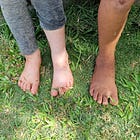Matchfaking
How we override our natural mate-selection mechanisms, and how we can prevent this
Have you ever wondered how your own contraceptive choices could affect your kids?
The rain had battered our camp all night and, as the metal riverboat moved away from the village we could see just how high the river had risen. A month of deluges had swelled it from shallow and rocky to vast and flat and flooding the forest for miles in all directions. It was the beginning of a tough few months. Finding food would be harder while the fish could stay in the jungle. Even the jaguars would need to stay in the branches. We watched trees pass, without any real sense of where the banks used to be.
Suddenly, we turned abruptly right and shot into the forest itself. Without dropping speed, the boat dodged stumps and vines, skirted the edge of glades, and left wake crashing off trunks and buttress roots behind us. The pilot knew the route like the back of his hand and enjoyed the wet season - it chopped hours off his weekly journey to the trading post. A bonus when you’re taking your teenage daughter to school for the term.
Centralised education is a new arrival for Guyanese Amerindian communities and has been seen as a mixed blessing. On one hand, larger classes bring the benefits of global knowledge and equip the students for more commercial or industrial jobs. On the other, keeping teenagers away from village traditions compromises their intrinsic cultural knowledge and heritage. It’s a contentious issue.
There is one benefit that nobody seems to mention. One that happens in between the classes and workshops. The same thing that, in 2000, drove biologist Steve Jones to call the invention of the bicycle the “most important event in recent human history”: It enables people to flirt outside of their own villages.
From a genetic perspective, this is great. More choice when selecting a life-partner means a higher diversity of genes on offer to give your future offspring the best possible start in life. A good example of this is the Major Histocompatibility Complex (or ‘MHC’) which is a protein that grabs onto things so they can be seen by the immune system. You have two types of MHC. One type from your mother, one type from your father. The more different they are from each other, the wider the range of things the pair can grab onto and the narrower the range of pathogens that can evade your immune system. Having more choice of mates means that genes for very different MHCs are available. This is good!
But choice is one thing. Choosing is another. How do our bodies choose which mate will give our offspring the best genetic platform to start from? Let’s go back to the MHC because it’s a good example and because it’s health critical.
Selection of a partner with very different MHCs to your own is actually so important that our sex drives have been built to encourage it. Ever wondered why some people just smell great no matter what they do? We are wired to be more attracted to a partner's smell if their MHCs are very different from our own, because this means that our potential babies will be healthier.

But this is where things get interesting. It turns out that messing with our sex hormones messes with this clever piece of immune programming. Women who select a partner while taking the contraceptive pill aren't as good at picking up on these scent-based cues, meaning they are more likely to pick partners with more similar immune systems. Couples with more similar immune systems appear to have more difficulty getting and staying pregnant. Babies born to couples who met while on the pill are more infection-prone, require more medical care, suffer from a higher frequency of common sicknesses, and are perceived as generally less healthy than children whose parents met while not on the pill.
Wait. Let’s just look at that again. I met my partner when I was 21. I wasn’t looking out for a long-term mate, but I certainly didn’t realise that the contraception I was on could make me pick the wrong person (from an immunological perspective, at least). Many of the women that I know were prescribed hormonal contraceptives while we were still at school, long before we had found a person we wanted to be the father of our children. We had no idea that this could affect the health of our not-yet-planned children.
I’ve seen several relationships break down when the couple started trying for a baby. I’d assumed that this was down to cold feet from one side or the other (let’s not buy into sexual stereotypes), but stopping hormonal contraception could also be a factor. Picking your partner when you are on the pill appears to predict less long-term attraction and sexual satisfaction, and when a woman comes off the pill, the sudden alteration in her desire for her partner can be devastating. (nb. On this topic, it’s worth reading ‘How the Pill Changes Everything,’ by Sarah Hill).
Clearly, effective contraception delivers enormous benefits to women by allowing them to control how and when they reproduce. But there are costs that are definitely not communicated. How should we think about using contraceptives in ways that cause less damage to families and children?
Have a much higher threshold for prescribing hormonal contraceptives to teenagers. Growing a brain while exposed to abnormal levels of sex hormones isn’t to be recommended unless there is no other alternative.
Discuss the risks of meeting a long-term partner while on hormonal contraception. Anyone who wants kids in the future should know that their contraceptive choices now could make everything harder later. They need to be able to weigh up the benefits and the costs to come to a decision that is right for them.
Favour non-hormonal forms of contraception. The copper coil, for example, is more reliable as a contraceptive, depends less on the individual, and, because it’s not hormonal, it doesn’t alter your mate choice, your attractiveness to others, and your stress response.
Birth rates had dramatically fallen in many of the villages we’d visited, thanks to the increasing availability of contraceptives. This benefits communities in all sorts of ways. But, having seen the constraints on healthcare provision, I wondered about how the introduction of hormonal contraception would affect the lives of the generations to come.
You may also like:
Notes
There’s so much I haven’t included, but this book is a great summary of the literature: Hill, Sarah E. How the pill changes everything: Your brain on birth control. Hachette UK, 2019.
Cycling reduces inbreeding: https://cyclingmagazine.ca/sections/news/cycling-played-a-huge-part-in-reducing-inbreeding/
Effect of the pill on the developing adolescent brain: https://www.sciencedirect.com/science/article/abs/pii/S2352154618300792
Partners with dissimilar MHCs are more attractive: https://onlinelibrary.wiley.com/doi/abs/10.1111/mec.13920
Women on the pill pick men with more similar MHCs https://royalsocietypublishing.org/doi/full/10.1098/rspb.2008.0825
Couples with more similar immune systems appear to have more difficulty getting pregnant https://academic.oup.com/humrep/article/37/Supplement_1/deac106.105/6620544
Couples with more similar immune systems appear to have more difficulty staying pregnant https://academic.oup.com/humrep/article/13/1/33/614369
Children of parents who met while they were on the pill are less healthy:
https://link.springer.com/article/10.1007/s40806-016-0074-4








This is a big claim that needs a citation. What’s the source? “Babies born to couples who met while on the pill are more infection-prone, require more medical care, suffer from a higher frequency of common sicknesses, and are perceived as generally less healthy than children whose parents met while not on the pill.”
Very very interesting information about how hormones can affect your choice in a mate but the advice to avoid it is incredibly reductive. For many the copper coil isn’t an alternative to pills ! The copper iud increases blood loss and cramping during periods and is a painful insertion- whereas hormonal IUDs like the mirena actually can make periods completely disappear- making it a better choice for those seeking relief due to endometriosis or other painful Conditions. Plus, pills are easier to take than inserting an IUD especially for women who haven’t yet had children. There isn’t a good non hormonal alternative available to women- more research needs to be done to give women real choices and treatments!!